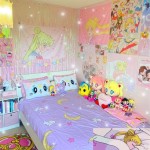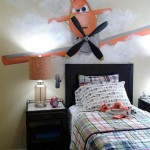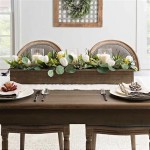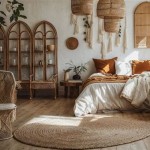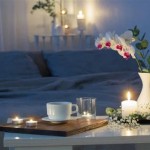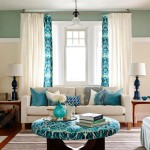Decorating Room by Room: A Comprehensive Guide
Decorating a home can feel like a daunting task. Breaking down the process room by room allows for a more manageable and focused approach. This method enables homeowners to consider the specific function and desired atmosphere of each space, resulting in a cohesive and personalized design throughout the entire home.
The Living Room: Creating a Welcoming Space
The living room serves as the central hub of the home, a space for relaxation, entertainment, and social gatherings. Creating a welcoming atmosphere is key. Begin by selecting a comfortable seating arrangement that encourages conversation and facilitates traffic flow. A well-chosen sofa, armchairs, and strategically placed coffee tables can achieve this. Incorporate soft textiles like throws and cushions to add warmth and texture. Consider the room's lighting, layering ambient, task, and accent lighting to create a balanced and inviting ambiance. Finally, personalize the space with artwork, decorative objects, and family photos to reflect individual style and create a sense of belonging.
Color palettes play a crucial role in defining the living room's atmosphere. Neutral tones create a calming backdrop, while bolder colors can energize the space. Consider the room's natural light when choosing colors, opting for lighter shades in rooms with limited sunlight. Introduce patterns and textures through rugs, curtains, and throw pillows to add visual interest and depth. A thoughtfully chosen rug can anchor the furniture and define the seating area.
The Dining Room: Fostering Connection and Conversation
The dining room is a space dedicated to sharing meals and fostering connection. The dining table serves as the focal point, its size and shape determined by the room's dimensions and the homeowner's entertaining needs. Choose comfortable dining chairs that complement the table's style and provide adequate support. Consider incorporating a buffet or sideboard for storage and serving. Lighting plays a crucial role in setting the mood for meals. A chandelier or pendant light centered above the table provides focused illumination, while dimmer switches allow for adjustable ambiance.
Decorative elements can enhance the dining room's atmosphere. A centerpiece, such as a floral arrangement or a decorative bowl, adds visual interest to the table. Artwork and mirrors can enhance the room's aesthetic appeal and create a sense of spaciousness. Window treatments, such as curtains or blinds, offer privacy and control natural light. A rug placed beneath the dining table can anchor the space and define the dining area.
The Bedroom: Designing a Sanctuary for Rest and Relaxation
The bedroom should be a sanctuary for rest and relaxation, a peaceful retreat from the demands of daily life. The bed is the centerpiece of the room, its size and style reflecting personal preferences and comfort needs. Choose a supportive mattress and comfortable bedding to ensure a restful night's sleep. Incorporate bedside tables for convenient access to essentials like lamps, books, and personal items.
Creating a calming atmosphere is essential in the bedroom. Soft, muted color palettes promote relaxation and tranquility. Consider incorporating calming hues like blues, greens, or lavenders. Minimize clutter and maintain a sense of order to create a peaceful environment. Soft lighting, such as bedside lamps and dimmer switches, allows for adjustable ambiance. Textiles, such as curtains, rugs, and throws, add warmth and texture to the space. Personal touches, like framed photos or cherished objects, create a sense of comfort and belonging.
The Kitchen: Enhancing Functionality and Style
The kitchen is the heart of the home, a space for culinary creativity and everyday meals. Functionality is paramount in kitchen design. Ensure adequate counter space for food preparation and consider the layout's workflow efficiency. Choose durable and easy-to-clean materials for countertops and flooring. Appliances should be strategically placed for optimal usability.
Style and aesthetics are also important considerations in kitchen design. Cabinetry style and color play a significant role in defining the kitchen's overall look. Backsplash materials offer both functionality and visual appeal. Lighting is essential for both task and ambient illumination. Consider incorporating under-cabinet lighting and pendant lights above the island or peninsula. Decorative elements, such as potted herbs, artwork, or colorful kitchen towels, can add personality and warmth to the space.
The Bathroom: Creating a Spa-Like Retreat
The bathroom can be transformed into a spa-like retreat, a space for personal care and relaxation. Choose fixtures and finishes that reflect personal style and create a sense of luxury. Consider incorporating a soaking tub, a spacious shower, or a double vanity. Storage solutions, such as vanities and shelves, help keep the space organized and clutter-free.
Lighting plays a crucial role in setting the mood in the bathroom. Incorporate both task lighting for grooming and ambient lighting for relaxation. Mirrors enhance both functionality and visual appeal, reflecting light and creating a sense of spaciousness. Textiles, such as plush towels and bath mats, add comfort and warmth. Decorative elements, such as candles, plants, and artwork, enhance the spa-like ambiance. Consider incorporating natural elements, such as wood or stone, to create a calming and organic atmosphere.

Bed Decoration Ideas To Recharge In Style Designcafe

Trending Room Decoration Ideas And Photos 2025

20 Diy Room Decor Ideas For The Win Unique With S

Aesthetic Roomcore Room Decor Dorm Accessories

Best Room Decorations 15 Latest Decor Ideas By Livspace

Take A Look At These Diy Room Decor Ideas And Transform Your Home

Diy Room Décor Ideas For Bedroom Design Makeover Beautiful Homes

Kids Room Decorating Ideas That Go From Toddler To Teen

30 Stylish Bedroom Wall Decor Ideas And Tips

10 Lovely Bedroom Decor Ideas Mom S Got The Stuff Dream Room Inspiration Redecorate Design
Related Posts
